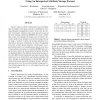Free Online Productivity Tools
i2Speak
i2Symbol
i2OCR
iTex2Img
iWeb2Print
iWeb2Shot
i2Type
iPdf2Split
iPdf2Merge
i2Bopomofo
i2Arabic
i2Style
i2Image
i2PDF
iLatex2Rtf
Sci2ools
215
click to vote
ICDE
2006
IEEE
2006
IEEE
Extending RDBMSs To Support Sparse Datasets Using An Interpreted Attribute Storage Format
"Sparse" data, in which relations have many attributes that are null for most tuples, presents a challenge for relational database management systems. If one uses the normal "horizontal" schema to store such data sets in any of the three leading commercial RDBMS, the result is tables that occupy vast amounts of storage, most of which is devoted to nulls. If one attempts to avoid this storage blowup by using a "vertical" schema, the storage utilization is indeed better, but query performance is orders of magnitude slower for certain classes of queries. In this paper, we argue that the proper way to handle sparse data is not to use a vertical schema, but rather to extend the RDBMS tuple storage format to allow the representation of sparse attributes as interpreted fields. The addition of interpreted storage allows for efficient and transparent querying of sparse data, uniform access to all attributes, and schema scalability. We show, through an implementati...
| Added | 01 Nov 2009 |
| Updated | 01 Nov 2009 |
| Type | Conference |
| Year | 2006 |
| Where | ICDE |
| Authors | Jennifer L. Beckmann, Alan Halverson, Rajasekar Krishnamurthy, Jeffrey F. Naughton |
Comments (0)

